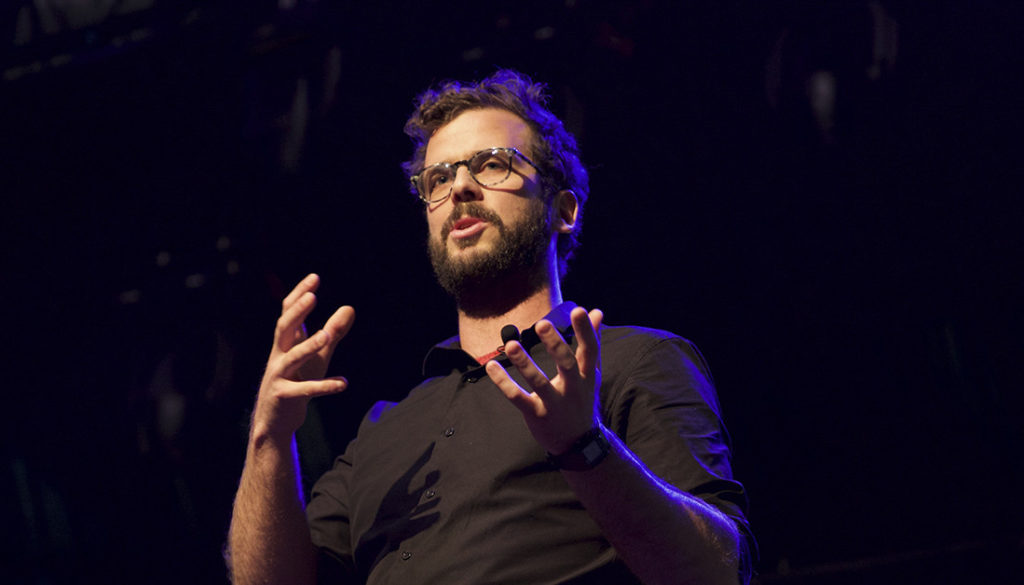Dr. Angus Hervey is a techno-optimist
Dr Angus Hervey is a science communicator, with a background in environmental economics and international political economy. He holds a PhD in environmental economics from the London School of Economics, and is the co-founder of Future Crunch, a forum for critical debate on the transition from the industrial to the digital era.
He is also the Australian manager of Random Hacks of Kindness, a global initiative started in 2009 by Google, IBM, Microsoft, NASA and Yahoo which connects technologists with social changemakers.
Future Crunch sounds like the name of a good dance party, could you tell us a bit more about what the name means and how you came up with it?
I actually met Tane, my co-conspirator with Future Crunch, at an outdoor dance party a few years ago. I was trying to construct a balloon LED line, a long string of helium balloons with little blinking LED lights inside them. Looks great at night! He came over to give me a hand, and the two of us ended up working together for an entire afternoon. We then released it… only for it to snap because I hadn’t bought fishing line with enough tensile strength. Four hours work for 12 seconds of watching our creation snake away over the horizon. Not entirely sure if this is a metaphor for the way we work. But it was a fun afternoon 🙂
On the whole, Future Crunch is very optimistic about future, why is that?
Well, both Tane and I strongly believe that we should be planning for a future in which things get better. The more people start believing we can create a better society, the sooner we can start taking action.
Optimism is the best way to create engagement and creativity. That’s very different to what we hear from the people who are supposed to be leading us. In politics, for example, the right emphasise threats such as crime, terrorism and immigration; while the left tell us that bankers are the devil, and that capitalism is predatory. And environmentalists tells us that our forests and oceans are being pillaged, that water wars are on the horizon, and that we’re on a collision course with a climate change time bomb.
Regardless of whether you think these views are correct, the problem with this fear-based approach is that while it might galvanise a few people into action, for the majority of us it breeds cynicism, apathy, hopelessness, and even hate. And those emotions don’t lead to solutions. That’s why we prefer to focus on optimism at Future Crunch.
Every time we explain how a better future might be built, we redraw the boundaries of what’s possible. We think that a shared belief in a better future is the strongest glue there is: it creates the opportunity for us to love and respect one another, and that’s an explosive force in politics.
You also run Random Hacks of Kindness, can you tell us a bit about that? What are some of the best projects to come out of the hackathons?
I’m the community manager, but I don’t really run Random Hacks of Kindness. Instead it’s run by the amazing community of volunteers who I help organise around Australia. The premise of RHoK is really simple – match up organisations that have a social impact with skilled technologists who want to make a difference. It’s been running in Australia since 2011, and is supported by three awesome tech companies: DiUS, REA Group and MYOB. Twice a year, we run hackathons in five locations across the country that bring together volunteer developers and tech-savvy do-gooders to work with charities, community groups and social enterprises.
Some of the stuff we’ve built has been amazing. For example, at the last Melbourne hackathon we created something called Local Linguist, an app designed to preserve Indigenous languages. It allows local researchers, in for example, East Timor to show local people pictures of things and get those recorded in the original language. The data is then uploaded to a database accessible by World Bank linguists so they can map those native languages. Another initiative I love is called Right Click Community, a platform linking teenagers with seniors to exchange digital literacy skills. It helps seniors to get skilled in computers and teenagers to gain teaching experience while also tackling the generation gap. Teenagers don’t really interact with old people and I love that way of bridging that generational divide.
You’ve been travelling across Australia giving keynotes about our utopian future, how do people usually react to your optimism?
I think people aren’t really responding to our optimism as much as they’re rediscovering their own optimism. There’s a big difference between the way the media portrays Australians, and the daily reality we see when we’re out there talking at events and conferences. There are hundreds of thousands of others who, like us, have had enough of hyper-materialism and selfishness, and who think there are new and better ways of doing things. Science and human ingenuity provide us with many of the tools we need. What matters now are the right intentions.
Remember, nothing about this needs to be naive. We can all understand that people are fallible, self-motivated and often mistaken about their best interests. We can recognize the massive differentials in power and wealth in our society and be clear-headed about the difficulty of opposing those whose prosperity is tied to planetary destruction. We can anticipate setbacks and failures, disappointments and betrayals. We can expect corruption and demand transparency. We can freely admit the profound difficulty of the work yet to be done, even the possibility of total failure.
But we can also believe that our best hope lies in a courageous optimism, an optimism that’s willing to confront the politicians and business leaders who tell us the world can’t change. In our experience, if you give people intelligent reasons for believing that better solutions are available, and that a better future can be built, it galvanizes them into real, meaningful action.
According to Ray Kurzweil, the singularity is near. How near do you think it is and what will it mean for society?
Kurzweil’s basic argument is that the digital revolution is actually part of a much larger process of technological progress, stretching back a long way through time. He claims that before the integrated circuit even existed, four previous ancestor technologies — electromechanical, relay, vacuum tube and transistor — all improved along the same trajectory. He formulated this as the Law of Accelerating Returns; and he believes that its logical conclusion is that one day, humans and technology will merge. We all get to live forever and commune in an ecstatic godlike state with the universe.
As you might be able to tell, I’m not a big fan of this kind of thinking. I think Kurzweil is an excellent predictor of technology trends – but like most other futurists he has a blind spot when it comes to the social questions.
Our future world is heavily, fundamentally layered. And that matters, because it’s the complex interplay of social systems of economics, human geography, history and politics that comes together to determine how technological advancements actually play out. If the technology to upload yourself into a computer exists, then who gets access to it? What kind of social counter movements might arise? How will governments regulate it? What if economics gets in the way, and AI systems cause a stock market crash that destroys the value of the companies that invented the technology in the first place? For answers to these questions we should turn to good, diverse science fiction – not old white geeks with fantasies about living forever.
Technology can always have positive and negative implications for society, what are some innovations or inventions on the horizon that peoples should be aware of?
We’re interested in technologies which we think have the greatest potential to make products or services available to a section of society that previously did not have access to them. We try to profile technologies that change the world for the better – and we think that’s what counts as real disruption. Tim O’Reilly has a principle for this, “create more value than you capture.” If we use that as our criteria, then the ones that make the list are rapidly advancing (e.g. gene-sequencing technology); have a broad reach (e.g. mobile internet); are more sustainable and better for the environment (e.g. 3D printing), have the potential to create a massive economic impact (e.g. advanced robotics) and have the potential to dramatically change the status quo (e.g. energy storage technology). We actually have around 10 technology areas we concentrate on – those are a few of them.
If you could sum up your philosophy about the future in one sentence, what would it be?
Optimism isn’t necessarily a reflection of the world around you. It’s a choice by which you can affect the world around you.
Transitions Film Festival is sharing good ideas using the hashtag #ideasbloom, what is one game-changing idea that you want to share?
Probably my favourite open source initiative on the planet right now is something called E-NABLE. Just take my word for it and click on this link. You’ll see what I’m talking about. http://enablingthefuture.org

